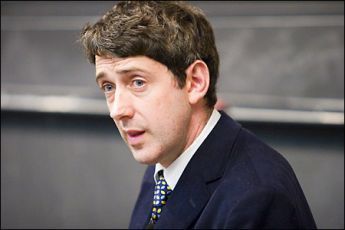Tough, but possible to make Darfur peace deal work – expert
May 8, 2006 (ABUJA) — Implementing a peace accord in Sudan’s Darfur region will be fraught with difficulties but the agreement can work if foreign donors keep their promises, said one of the experts who wrote the deal’s security provisions.
 The Sudanese government and Darfur’s biggest rebel faction signed a peace settlement on Friday to end a conflict that has killed tens of thousands of people and driven more than 2 million from their homes.
The Sudanese government and Darfur’s biggest rebel faction signed a peace settlement on Friday to end a conflict that has killed tens of thousands of people and driven more than 2 million from their homes.
“There is no euphoria. No one here is thinking this is going to be easy,” said Alex de Waal, who was closely involved in negotiations in the Nigerian capital that yielded the accord.
Two rebel movements, the Sudan Liberation Army (SLA) and the smaller Justice and Equality Movement (JEM), took up arms in early 2003 accusing the government of neglecting Darfur, an arid region the size of France in western Sudan.
Khartoum backed tribal militias known as Janjaweed to crush the rebellion. A campaign of killings, rape, looting and arson has created a humanitarian catastrophe.
The main faction of the SLA, led by Minni Arcua Minnawi, signed the peace agreement. But a rival SLA faction led by Abdel Wahed Mohammed al-Nur rejected it, as did the JEM.
De Waal said their refusal to sign would create problems during the implementation but these were not insurmountable.
“The spoilers are weak militarily which is the most important element. Their main card is propaganda,” de Waal told Reuters in an interview at the hotel where the talks took place.
The African Union (AU), which mediated the peace talks and has 7,000 peacekeepers in Darfur, is preparing booklets and radio broadcasts to try and counteract misinformation that risks undermining support for the deal among the people of Darfur.
CEASEFIRE
The Nur faction and the JEM are bound by a 2004 ceasefire, which has been violated by all sides, but de Waal said the new peace accord contains much stronger mechanisms for enforcing the ceasefire such as punitive measures against violators.
“They’re going to find themselves locked into the ceasefire,” he said, referring to those who had not signed.
The agreement raises hope that a U.N. force will be allowed into Darfur to help out the poorly equipped and under-funded AU troops, as Khartoum has said it would consider such a force after a peace deal was signed. It had previously rejected it.
The accord could also help garner more international funding for Darfur. Aid agencies say donations for Darfur have dropped, but de Waal said foreign countries preferred putting money into reconstruction rather than emergency relief while a war was on.
A promising sign was efforts by the Netherlands, which are taking the lead in assessing Darfur’s reconstruction needs and planning a donors’ conference for September in the Hague.
Funding from the international community would be critical to the success of the accord, de Waal said. The AU needs extra money and equipment while it verifies the different stages of implementation, as well as for longer-term requirements.
One fear expressed by many analysts is that the government was not sincere in seeking peace, but De Waal said there were reasons to hope Khartoum meant what it had signed.
“The government wants to close the file of the war in Darfur,” he said, adding that one reason for this was that constant international scrutiny and criticism had become a headache for the authorities.
He also said the Darfur conflict was distracting the government from implementing a Comprehensive Peace Agreement (CPA) that ended a much longer war between the North and the South, and this was politically untenable.
“Darfur is poisoning the CPA and the government really needs the CPA. It needs to normalise the North-South peace,” he said.
(Reuters)
On the Net:
AUDIO – Violence in Darfur Teeters on Brink of Chaos : Alex de Waal talks with NPR about the AU peace document.
